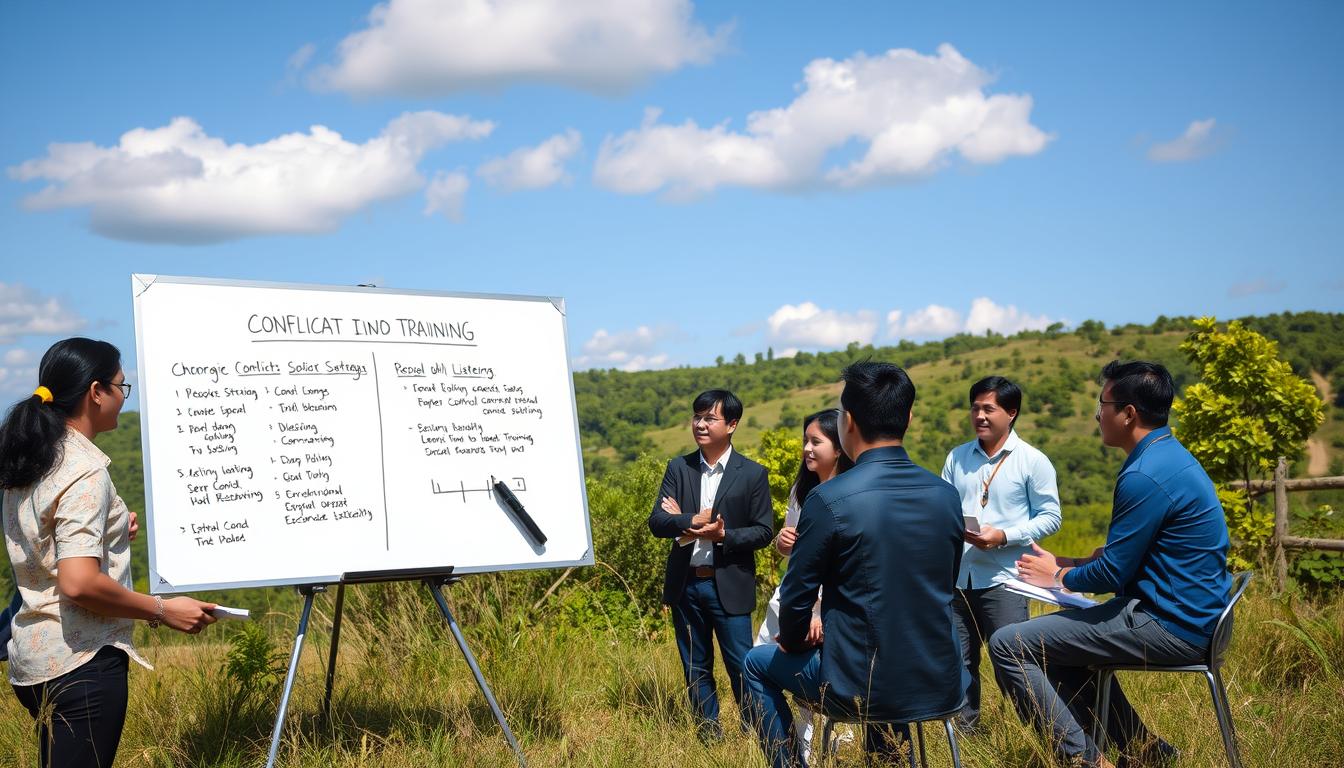Ever thought about how silent tensions can hurt your field team’s work? Conflict management training is key in fast-paced work settings. It’s vital to teach your team how to handle disputes well. This way, your workplace can be healthier.
Such training boosts communication and helps prevent conflicts in the field. Companies like Pollack Peacebuilding create workshops tailored for field teams. They make sure the training fits the team’s needs perfectly.
With a good plan for managing conflicts, teams feel less stressed and work better together. Let’s explore how this training helps field teams succeed in tough situations.
Key Takeaways
- Effective conflict management training enhances team collaboration.
- Conflict resolution workshops help identify unique challenges in field operations.
- Communication skills training is essential for successful conflict resolution.
- Customized programs, like those from Pollack Peacebuilding, cater to specific needs.
- Proactive management reduces interpersonal stress and boosts productivity.
The Importance of Conflict Management in the Workplace
Conflict is a normal part of work life. Knowing how it affects teams is key to a better work culture. Good conflict management keeps team relationships strong and solves problems early.
Understanding the Impact of Conflict on Team Dynamics
Ignoring conflict can hurt morale, stress levels, and productivity. It can make people feel left out or not understood. But, with communication skills training, teams can work better together. This training helps everyone feel heard and valued.
Positive vs. Negative Outcomes of Conflict
Conflicts can have good or bad effects. Ignoring them can lead to more problems. But, dealing with them well can spark new ideas and solve problems better.
Training teams to handle conflicts well is good for everyone. Here’s a look at the differences:
| Outcome Type | Negative Outcomes | Positive Outcomes |
|---|---|---|
| Employee Morale | Decreased engagement and job satisfaction | Improved team spirit and cohesiveness |
| Productivity | Lower overall performance and efficiency | Enhanced brainstorming and idea generation |
| Communication | Increased misunderstandings and frustration | Better collaboration and mutual understanding |
Why Field Teams Need Specialized Conflict Resolution Training
Field teams work in fast-paced, high-pressure settings. They face challenges due to different personalities and cultural backgrounds. Special training helps them handle these issues well.
Unique Challenges Faced by Field Teams
Field teams deal with:
- High-stress levels from tight deadlines and important tasks.
- Varying communication styles because of cultural differences.
- Diverse team dynamics from different work experiences.
A workshop on conflict resolution for field teams offers practical solutions. It helps members work together better.
The Nature of Interpersonal Relationships in Field Work
Team relationships in fieldwork are key. Good communication and teamwork build unity. A conflict coaching program boosts these skills.
- Understand each other’s perspectives better.
- Develop trust for open talks.
- Manage disagreements without hurting team spirit.
Specialized training equips field teams to solve conflicts well. This boosts their performance and keeps morale high.
Key Skills Developed Through Conflict Management Training
Conflict management training teaches important skills for a peaceful workplace. These skills help improve how we work together and boost team productivity.
Effective Communication Skills Training
Learning to communicate well is key to solving conflicts. When we share our thoughts and feelings clearly, we avoid misunderstandings. This makes it easier to find solutions to problems.
This training helps us talk through tough issues with respect and professionalism. It leads to better relationships at work.
Active Listening Techniques for Better Understanding
Using active listening is crucial for getting different viewpoints. When we listen fully and show we care, trust and empathy grow. This lowers tensions and helps solve problems in a positive way.
By learning these listening skills, we create a supportive work environment. Everyone feels heard and valued.
Understanding Workplace Conflict: Causes and Types
Workplace conflict comes from many sources. It’s key for teams to know these causes to solve problems well. Learning about conflict types helps teams work better together. Training on these topics is vital for a peaceful workplace.
Identifying Divergent Goals among Team Members
One big cause of conflict is when team members have different goals. When goals clash, it can lead to frustration and slow down work. Workplace conflict training teaches how to spot these differences and talk about aligning goals. This helps teams work together better.
Addressing Miscommunication and Cultural Differences
Many conflicts come from not understanding each other, made worse by cultural differences. Teams must learn how different cultures communicate. Training in conflict negotiation techniques helps teams value diversity and manage communication differences. This training builds respect and awareness.
Knowing the causes of conflict helps teams tackle problems early. With the right workplace conflict training, teams can feel heard and understood. This makes the workplace better for everyone.
Choosing the Right Conflict Management Training Program
Choosing the right conflict management training is key to better team work and success. It’s important for companies to make the training fit their unique culture and needs. This way, team members can use what they learn in real situations.
Customizing Training to Fit Company Culture
When planning a conflict resolution workshop, consider these points:
- Know your company’s values and mission.
- Use scenarios that happen in your workplace.
- Include case studies that match your work environment.
- Make learning modules that help teams work together.
Evaluating Instructor Experience and Program Reputation
The success of conflict management training depends on the instructors and the program’s reputation. Here’s what to look at:
| Criteria | Importance | Key Factors |
|---|---|---|
| Instructor Credentials | Ensures expert delivery | Years of experience, background in negotiation |
| Program Recognition | Boosts credibility | Accreditations, partnerships with recognized organizations |
| Participant Feedback | Reflects effectiveness | Past participants’ success stories, testimonials |
By paying attention to these factors, companies can make their conflict management training more effective. This leads to better team work and success in facing workplace challenges.
Strategies for Effective Conflict Resolution
It’s key to have good strategies for solving conflicts at work. Using conflict negotiation techniques helps teams talk things out in a good way. This way, they can handle disagreements and misunderstandings better.
Utilizing Conflict Negotiation Techniques
Conflict negotiation techniques help teams solve problems peacefully. They include a few important steps:
- Preparation: Knowing what everyone needs and wants is important for good talks.
- Open Dialogue: Talking openly lets team members share their worries without fear.
- Focus on Interests, Not Positions: This helps find solutions that everyone can agree on.
- Problem-Solving Mindset: Trying to solve the problem, not just win, is key.
Mediation Practices for Team Disputes
Mediation is a great tool for managing conflicts. It lets a neutral person help teams talk things out. This way, everyone gets a chance to be heard, leading to fair solutions. Mediation has many benefits:
- Increased Understanding: People learn more about each other’s views.
- Reduced Tension: A mediator can calm things down, helping teams stay focused.
- Collaborative Solutions: Mediation encourages teams to find solutions that work for everyone.
Measuring the Effectiveness of Conflict Management Training
It’s key to check how well conflict management training works. A good workshop should show clear changes in how people act. Seeing these changes in real situations shows the training’s worth.
Behavior Change and Application in Real Scenarios
Tracking changes in behavior is a big win for companies. Watching how people act in teams shows if they use what they learned. Signs of success include:
- Improved communication among team members
- Increased willingness to engage in constructive conflict
- Evidence of enhanced problem-solving skills
Feedback Mechanisms for Continuous Improvement
Getting feedback is vital for improving training. Surveys and follow-up talks help gather insights from those who took the workshop. This feedback is key for:
- Identifying areas that require further training
- Adapting future training programs to meet evolving needs
- Enhancing overall training effectiveness over time
Real-world Applications of Conflict Management Training
Conflict management training is key for businesses, especially in the Philippines. It helps solve current problems and gets teams ready for the future. This section looks at success stories that show how training can change things for the better.
Case Studies from Philippine SMEs
Small and medium businesses in the Philippines have seen big changes with conflict training. For example, a local factory used a conflict coaching program to improve team understanding. This led to fewer fights at work and a happier team.
- They started talking openly thanks to a new training program.
- Teams worked better together, thanks to learning how to solve problems.
- They made more products because they spent less time on arguments.
Benefits of Conflict Coaching Programs in the Field
Field teams benefit a lot from conflict coaching programs. They learn how to handle problems on the job. Some big advantages include:
- Improved Communication: Workers talk better, avoiding mix-ups.
- Stronger Team Cohesion: Teams work together better, creating a team spirit.
- Increased Employee Retention: Happy teams mean fewer people leave.
Conflict Management Certification: Elevating Your Team’s Skills
In today’s fast-paced work environment, conflict management certification is key. It helps teams build a strong conflict resolution framework. Getting certified shows a team’s commitment to learning effective conflict resolution techniques.
This not only boosts individual skills but also strengthens the team’s overall ability. It’s a big step towards creating a more harmonious workplace.
The Value of Professional Development in Conflict Strategy
Getting a conflict management certification is a sign of professional growth. Teams with certified members are ready to tackle conflicts head-on. This leads to a more peaceful work environment.
When team members learn effective conflict resolution, they understand different conflict dynamics. This helps turn potential disputes into chances for teamwork.
The advantages of using certified conflict management strategies include:
- Enhanced skills: Team members learn advanced techniques for resolving conflicts in various situations.
- Improved communication: Training encourages open dialogue, leading to transparency and understanding among team members.
- Stronger relationships: By mastering conflict resolution, teams build trust and cohesion, reducing misunderstandings.
- Increased productivity: Quick conflict resolution means less disruption and more focus on core tasks.
Steps to Implement Conflict Management Training in Your Organization
Starting a conflict management training program needs careful planning. To get the most out of it, create a detailed training plan that fits your team’s needs. This plan helps everyone know their part in the training.
Creating a Training Schedule and Framework
The first step is to make a detailed schedule. It should cover all important topics, from finding conflict causes to solving them. Here’s a basic guide to help you plan:
- Find out what your organization really needs.
- Choose the main topics for your workplace training.
- Make sure each session has enough time for learning and practice.
- Plan follow-up sessions to keep learning going and tackle new issues.
Involving Your Team in the Process for Greater Engagement
Getting your team involved in the training makes it more effective. Talking openly about what to cover and how to train helps everyone feel invested. Here are some steps to take:
- Do surveys or focus groups to hear about workplace challenges.
- Ask team leaders for their thoughts on training modules.
- Let teams take part in a workshop, so they can practice solving real problems.
Conclusion
Investing in conflict management training for field teams is key. It helps create a workplace where everyone works together well. Field teams face special challenges that need specific training to solve conflicts well.
When companies focus on this training, they improve teamwork and productivity. This leads to better growth for the company.
Effective conflict resolution training is a team effort. It needs everyone in the company to work together. By talking openly and understanding each other, companies can reduce misunderstandings.
This is especially important for small businesses in the Philippines. Teamwork is crucial for reaching goals.
Putting conflict management first improves workplace relationships. It helps field teams turn conflicts into chances for growth. This makes conflict management essential for their success.
FAQ
What is conflict management training?
Conflict management training teaches employees how to deal with disagreements. It helps teams work better together by improving communication and solving problems. This makes the workplace a better place for everyone.
Why is conflict resolution workshop important for organizations?
Workshops on conflict resolution give teams the tools to handle disagreements well. They learn how to understand and solve problems together. This reduces stress and makes teams work better together.
What skills can be gained from communication skills training?
Training in communication helps people share their thoughts clearly. It also teaches them to listen well and understand others. These skills are key to solving conflicts and working well together.
How does workplace conflict training benefit field teams?
Training for workplace conflicts helps field teams deal with their unique challenges. It prepares them for different personalities and stressful situations. This leads to better teamwork and performance.
What are some effective conflict negotiation techniques?
Good negotiation techniques include defining problems, finding solutions, and focusing on what everyone wants. These steps help people find agreements without fighting.
Why should my organization consider conflict management certification?
Getting certified in conflict management shows you care about your team’s growth. It gives them strong skills to handle conflicts, making your team stronger.
What steps should we take to implement a conflict coaching program?
To start a conflict coaching program, create a solid training plan. Make sure everyone is involved and has access to resources. This helps everyone work together better and manage conflicts well.
How can I measure the effectiveness of conflict management training?
To see if training works, check if people’s behavior changes. Use surveys to get feedback and hold follow-up sessions. This helps make the training even better over time.
What are the real-world applications of conflict management training?
Conflict training has real benefits, like improving team performance and communication. It works in different workplaces, as shown by examples from Philippine SMEs.
What makes tailored conflict resolution workshops unique?
Customized workshops address specific challenges of an organization. They make sure the training is relevant and useful. This has a big impact on team dynamics and performance.



